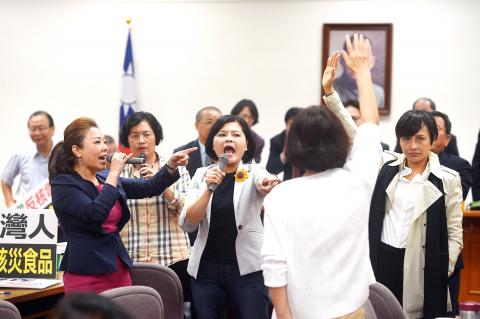The Chinese Nationalist Party (KMT) caucus yesterday accused the Democratic Progressive Party (DPP) of trying to shield the Council of Agriculture from answering a call by KMT lawmakers to present a special report on imports of food products from Japan’s radiation-affected regions.
The caucus also slammed DPP Legislator Chiu Yi-ying (邱議瑩) for using a term widely considered offensive by Aborigines to describe KMT lawmakers during a verbal spat.
KMT lawmakers asked the legislature’s Economics Committee to call on the council to prepare a special report in today’s committee meeting on government measures relating to its plan to lift the ban on food imports from five Japanese prefectures that were affected by the Fukushima Dai-ichi nuclear power plant meltdown in 2011.

Photo: George Tsorng, Taipei Times
The proposal was vetoed by their DPP counterparts, who said that the committee meetings held yesterday and today are for reviewing the council’s budget and that the schedule is tight.
KMT Legislator and committee member Chang Li-shan (張麗善) told a news conference later yesterday that the KMT had made the request because the public hearings called by the government had failed to do their job.
“Ten public hearings in three days is not what an issue of such importance deserves. We hope the council takes this issue seriously, as the imported goods will mostly be manufactured from agricultural products, and the report should not wait until the review of its budget is completed,” Chang said.
KMT caucus whip Sufin Siluko (廖國棟) then lashed out at Chiu, accusing her of using a “discriminatory term for Aboriginal people that was directed either at me or another [Aboriginal] KMT legislator, Yosi Takun (孔文吉)” during the meeting.
“I did not actually hear her say the word, but the media and our office did,” he said, playing a recording of Chiu’s remarks several times at the news conference.
The term Chiu used was huan-a (番仔, uncivilized person) in Hoklo (commonly known as Taiwanese).
Chiu was heard saying it was “no use talking to these huan-a.”
Sufin Siluko said that the KMT caucus is recommending that Chiu be referred to the Discipline Committee for disciplinary review.
Yosi Takun demanded that Chiu apologize to the nation’s Aborigines.
“The country formally changed the official name of the group from the [discriminatory] ‘mountain people’ to ‘Indigenous people’ as early as 1991. I cannot believe that a DPP lawmaker just used the word in the legislature,” he said.
In response to the criticism, Chiu asked the KMT lawmakers to “look it up in the Wikipedia, as the term means ‘unreasonable people,’ and what the KMT lawmakers did in the committee was just that.”
She said she does not understand why she should be sent to the Discipline Committee for using that word.
“They are being paranoid,” Chiu added.
New Power Party Legislator Kawlo Iyun Pacidal, an Amis Aborigine, said in a statement that insofar as Aborigines are still an underprivileged group in Taiwanese society, the word is, in its historical and social context, a pejorative term that was used to refer to Aboriginal people.
“It is definitely not Aboriginal people being ‘paranoid’ when they react strongly to the term; it is part of their real life experience,” she said.
Additional Reporting by CNA

US President Donald Trump said "it’s up to" Chinese President Xi Jinping (習近平) what China does on Taiwan, but that he would be "very unhappy" with a change in the "status quo," the New York Times said in an interview published yesterday. Xi "considers it to be a part of China, and that’s up to him what he’s going to be doing," Trump told the newspaper on Wednesday. "But I’ve expressed to him that I would be very unhappy if he did that, and I don’t think he’ll do that," he added. "I hope he doesn’t do that." Trump made the comments in

Tourism in Kenting fell to a historic low for the second consecutive year last year, impacting hotels and other local businesses that rely on a steady stream of domestic tourists, the latest data showed. A total of 2.139 million tourists visited Kenting last year, down slightly from 2.14 million in 2024, the data showed. The number of tourists who visited the national park on the Hengchun Peninsula peaked in 2015 at 8.37 million people. That number has been below 2.2 million for two years, although there was a spike in October last year due to multiple long weekends. The occupancy rate for hotels

A cold surge advisory was today issued for 18 cities and counties across Taiwan, with temperatures of below 10°C forecast during the day and into tonight, the Central Weather Administration (CWA) said. New Taipei City, Taipei, Taoyuan and Hsinchu, Miaoli and Yilan counties are expected to experience sustained temperatures of 10°C or lower, the CWA said. Temperatures are likely to temporarily drop below 10°C in most other areas, except Taitung, Pingtung, Penghu and Lienchiang (Matsu) counties, CWA data showed. The cold weather is being caused by a strong continental cold air mass, combined with radiative cooling, a process in which heat escapes from

Snow this morning fell on Alishan for the first time in seven years, as a strong continental cold air mass sent temperatures plunging across Taiwan, the Central Weather Administration (CWA) said. The Alishan weather station, located at an elevation of about 2,200m in central Taiwan, recorded snowfall from 8:55am to 9:15am, when the temperature dropped to about 1°C, the CWA said. With increased moisture and low temperatures in the high-altitude Alishan area, the conditions were favorable for snow, CWA forecaster Tsai Yi-chi (蔡伊其) said. The last time snow fell at the Alishan weather station was on Jan. 10, 2018, while graupel fell there